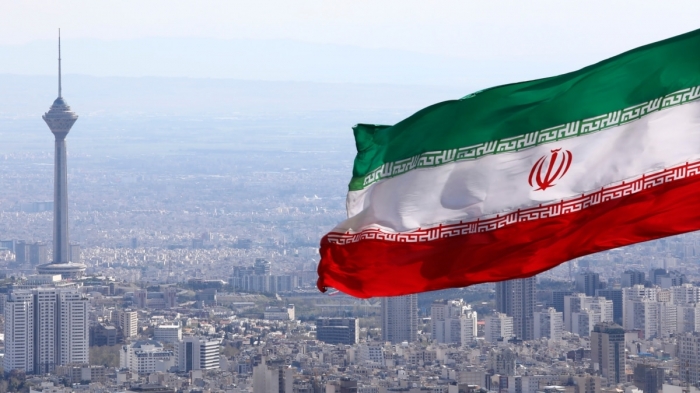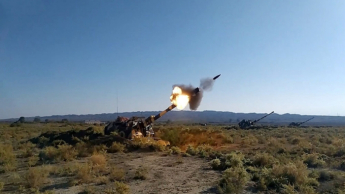Iran's future place in the South Caucasus will largely depend on Azerbaijan

|

The geopolitical tension created by Iran on the border with Azerbaijan has been growing in recent weeks. During the 30-year-old Armenian occupation, official Tehran, which used the uncontrolled section of the border at its own discretion, a few days ago decided to start unexpected military exercises in the direction of Julfa-Aslanduz-Mugan for the first time.
The geopolitical tension created by Iran on the border with Azerbaijan has been growing in recent weeks. During the 30-year-old Armenian occupation, official Tehran, which used the uncontrolled section of the border at its own discretion, a few days ago decided to start unexpected military exercises in the direction of Julfa-Aslanduz-Mugan for the first time.
The military exercises are also supposed to put pressure on official Baku against the background of Azerbaijan's practical blocking of Iranian freight traffic in Khankendi along the Gorus-Gafan road, although they are part of an interesting mosaic and are very important against the background of Baku's principled position.
The Iranian Ambassador to Azerbaijan met twice with the Assistant to the President for Foreign Policy Hikmet Hajiyev.
After the first meeting, two Iranian drivers have been arrested for transporting illegal cargo in Khankendi. After the second meeting, the Iranian Foreign Ministry demanded the release of the drivers with a statement “we support the territorial integrity of neighboring countries"
Against this background, military exercises continue on the border with Azerbaijan for the first time in history with the participation of the Islamic Revolutionary Guard Corps. The pulling of Iranian military equipment and heavy weapons into the regions bordering with Azerbaijan has led to a potential armed conflict. According to the data, after Iranian troops began conducting military exercises using tanks, drones, multiple launch rocket systems and tactical missiles, Azerbaijan decided to bring the troops to a state of full combat readiness and pulling equipment to the border with Iran.
This means that Tehran has not achieved anything with contacts in Baku and official Baku has not retreated from its tough and fair position.
During these military exercises, President Ilham Aliyev interviewing to "Anadolu Agency" stated that during the 30-year period of independence, there were no military exercises held near our border. Why are they held when we liberated the lands?
Any country can conduct military exercises on its territory. This is her sovereign right, no words. However, at the same time, analyzing this in a certain period, we see that this has never happened" – stated President Aliyev.
Tehran's concern was evident after the Second Karabakh War, but not without reason. All these past 30 years, Iran, based on its policy "Realpolitik", has always been interested in the weakness of Azerbaijan. A strong and independent Azerbaijan is a real and genuine threat to the national security of the Islamic Republic of Iran.
That is why the Iranian mullocracy after the events on the Gorus-Gafan road understands that the future place of Iran in the South Caucasus will largely depend on Azerbaijan.
After the solution of the Zangezur corridor, this dependence will double, and, realizing this geopolitical factor, Tehran stepped up its activities along an alternative route to the corridor. However, the actions of official Baku on the Gorus-Gafan section of the sovereign territory of Azerbaijan confirmed that Baku could limit Tehran's interests in the region without opening the Zangezur corridor.
This aggressive policy of Iran stems from the inability of the Iranian Ayatollahs to digest their dependence on Baku.
Moreover, it seems that Iran is trying to use the factor of military force by conducting military exercises right on the border with Azerbaijan because Iran cannot get what he wants from Baku through diplomatic channels.
The Gorus-Gafan road is part of the mosaic, the Turkish-Israeli factor that frightens Iran. Ayatollahs are sending a signal that they do not accept the presence of these two countries in Karabakh with border exercises.
In addition, I would like to ask how the noble country-leader of Shiism in the world “tolerated” and actually ignored the Armenian occupation and Armenian vandalism for 30 years.
The Ayatollah regime, calling itself the defender of "oppressed Muslims" in Palestine, simply "did not notice" the suffering of 1 million Azerbaijani Shiite refugees, the destroyed and insulted Azerbaijani cities actually on their own border with Azerbaijan. With the full connivance of Iran, not a single house, not a single kindergarten or school, not a single library and museum remained in the entire liberated territory. The Armenian occupation army was engaged in looting and vandalism, wiping cities such as Fizuli, Gubadli, Jabrayil and Zangilan from the face of the earth.
The Armenian occupants destroyed and wiped out this beautiful region of Azerbaijan, for 28 years committing massive vandalism, committing environmental and cultural genocide over this territory. Moreover, the rhetorical question is asked - where was the Ayatollah regime all this time, when the Azerbaijani Shiites suffered, were destroyed, insulted and humiliated in Khojaly?
When this regime needs it, they send missiles, drones, artillery shells to terrorists of Hamas and Hezbollah. In addition, for 30 years of the Armenian occupation and vandalism of the Ayatollahs, they have not seen anything. No, they saw everything, and therefore all these years they supplied Armenia with oil, gas, building materials, and cheap building materials were transported to Iran from Karabakh from the remains of plundered and destroyed houses of Azerbaijanis, plundered museums and kindergartens, schools and theaters, having committed urbanicide in this territory.
Turkish factor: Iran was the country that suffered the most losses in the region because of the Second Karabakh War. In addition, with the arrival of Turkey in the region, Iran was geopolitically ousted from the South Caucasus. Official Tehran views the latest exercises of Turkey and Azerbaijan - both in the liberated territories and in the Caspian Sea - as a threat to its national security.
The Israeli factor: unlike Iran, which is actually on the side of Armenia, the Israeli government and Israeli companies, always supporting Azerbaijan, naturally participate in the process of restoring the liberated territories. Israel is sincerely happy for the just victory of its important geopolitical and geostrategic partner in the South Caucasus as Azerbaijan.
Iran views this as "the arrival of a Zionist enemy at its borders" and expresses concern over Tel Aviv's "audacious" foreign policy behavior.
Recently, the spiritual leader of Iran said that there will be no Israel in the next 25 years, but the Ayatollahs forget a little that the State of Israel is one of the most powerful core states in the Middle East, which has the most powerful army with the most advanced technologies of the 21st century, where super technologies and cyber security decide huge strategic and tactical issues of military affairs.
Do not forget that no country in the post-Soviet space has received from Israel so many important strategic and tactic weapons that Azerbaijan has received in recent years, including during the Second Karabakh War.The recent events on the border give reason to believe that the desire of official Tehran "to participate in the process of restoring the liberated territories of Azerbaijan" was diplomatically rejected by Baku.
When the process of reconstruction and revival of Karabakh began, Tehran brought to Baku a proposal for "participation of Iranian companies" and put forward it at every opportunity. Official Baku justly does not accept this proposal because Iran was one of the co-authors of the whole process, from the plundering of Karabakh during the occupation to the falsification of the Azerbaijani material and cultural heritage there.
Having gained the right to participate in the process of restoring the lands of Karabakh, Iran wants to ensure a certain balance of power in the region against Turkey, as well as against Israeli companies actively participating in this process. In fact, one of the objectives of the cross-border exercises is to accept Baku's proposal "on the participation of Iranian companies in the reconstruction process." However, this goal seems difficult for Iran, which during the occupation "burned all bridges" and still continues to financially and politically support the separatists in Khankendi.
The author is the israeli political analyst, head of the ISP 'International Society Projects', an NGO at YR Group and the head the Israeli branch of the Baku International Multiculturalism Center
(If you want to contribute and have specific expertise, please contact us at [email protected])
The Rocket and Artillery formations of the Azerbaijan Army conduct live-fire exercises in accordance with the combat training plan for 2021, the Ministry of Defense of Azerbaijan told Baku Tribune.
LAST NEWS






.jpg&h=67&w=67&zc=1&q=100)












